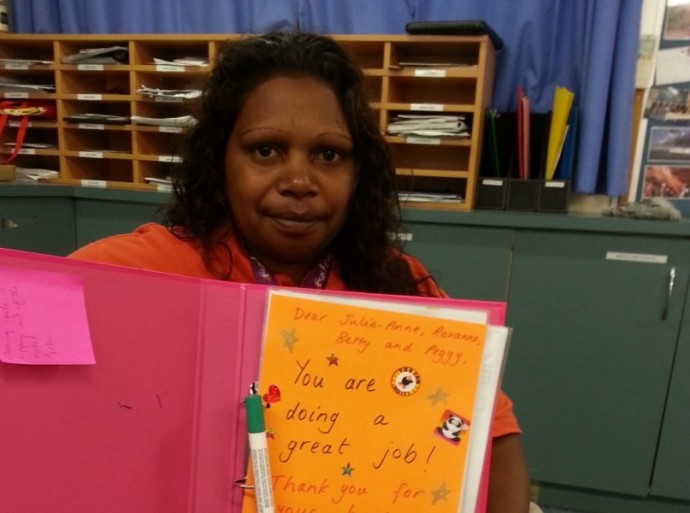Lack of employment and socio-economic factors were just some of the reasons that school attendance was dismal in the remote South Australian town of Mimili, but with the implementation of a new strategy, changes are already evident.

Mimili Anangu School Attendance Supervisor Julieanne Campbell shows off a thank you letter from the teachers.
“The Remote School Attendance Strategy was rolled out at the beginning of this year and it has certainly, in Mimili, had a fairly positive impact on the overall data of school attendance,” says Mimili Anangu School Principal, Louka Parry.
The strategy has seen the employment of School Attendance Officers, including School Attendance Supervisor, Julieanne Campbell. Julieanne and her team travel the community offering support in helping get kids to school. This has lifted the burden from teachers.
“There are a great number of students that come to school and have a very supportive family but we’ve found that having the attendance team there as well, has taken some of the pressure off the school so that we can focus more on teaching and learning outcomes,” says Louka.
“Previously, those roles were very much the role of individual teachers. So we would have teachers going around to try and find their students while they’re also planning for the teaching and learning of the school day, which is stretching the role quite a lot.”
Situated on the Anangu Pitjantjatjara Yankunytjatjara Lands, many of the Elders of the community never received a formal education; this lack of schooling is something that Louka hopes does not become transgenerational.
“This is a very complex issue, and I think the attendance strategy is just one part of the solution; it’s certainly not the be all and end all,” he says.
“Sometimes it’s difficult for children to see the value because they don’t see the economic benefit as you might see in a larger place. If you finish school, there isn’t a job waiting for you in Mimili necessarily, you have to leave and go somewhere else or look for a traineeship.
“So that can be a challenge but we know the inherent value of education and certainly, now, everyone is on the same page and talking about that same message.”
Now that attendance is up at the 40-year-old school that used to take place in a caravan, the next step is to make sure that comprehensive teaching and learning takes place at Mimili, according to Louka.
“Having a dedicated team allows us to collaborate and coordinate with them and support them when necessary, as we still do. But it means there is time now for us (teachers) to focus on other factors within the school,” he says.
Comments are closed.